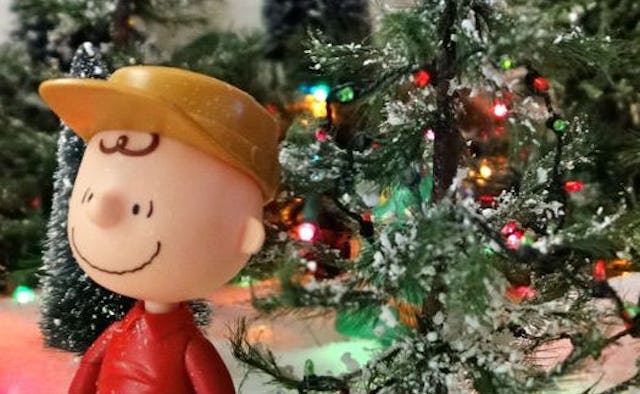Charlie Brown, Bi-Religion, and the True Meaning of Christmas

“Isn’t there anyone who knows what Christmas is all about?” exclaims our favorite sad sack protagonist, Charlie Brown, his arms spread wide in exasperation. It’s one of my favorite parts of the holiday, those animated Christmas specials. Seuss and Schultz knew how to hit all the warm and fuzzy spots.
In sweeps Linus, with his hygienically questionable security blanket, to save the day. “Sure, Charlie Brown, I can tell you what Christmas is all about,” he proclaims. He then goes on to cite a Bible verse about the birth of his savior, Jesus Christ—and it goes right over my head, every time. Linus might as well be one of the show’s iconic, trombone-blaring adults.
Nothing Biblical resonates with me because I’m a half-breed heathen. My mother’s family is Jewish and my father’s family is Episcopalian. Or Methodist. One of those Protestant offshoots. So, I don’t just celebrate Christmas, I also celebrate Hanukkah. That’s right. I’m bi-religious. I swing both ways, baby. So I get a lot of memes and bumper stickers telling me that I celebrate the holidays all wrong.
I don’t go to church or temple. I learned most of the history of (C)han(n)uk(k)a(h) via a rather entertaining Rugrats special (sorry, Nana), and my Biblical knowledge mostly comes from things that have unintentionally latched on from screaming pundits on Fox News. Also a smattering of Simpsons parodies. Hence, according to the many bumper stickers and Facebook memes I’ve seen recently, I’m an abomination and responsible for the degradation of our good Christian society.
I must take issue with these sentiments. First of all, Jesus is the reason for the season? If Jesus were the reason for the season, we wouldn’t be celebrating in December, since that date was most likely chosen to comply with the pagan Winter Solstice. We also wouldn’t “deck the halls with boughs of holly,” because that was, again, originally a pagan tradition that the early Church actually campaigned to suppress. Second of all, “Put the Christ back in Christmas?” Excuse me while I channel my inner Cartman (“Whatever. I do what I want.”).
If, to you, Christmas is a religious celebration of the birth of the head of your church—wonderful! Celebrate that. Enjoy it. But please, keep in mind that that’s not what the holiday season means to everyone.
To me, the holiday season is lighting the candles of the menorah while my goy of a Dad sings a tone-deaf “Happy Chanukah to you!” and we all group hug. It’s my grandfather saying the blessing over the candles as my extended family gathers to eat latkes and applesauce. To a friend of mine, Christmas is performing a family pageant play complete with news reporters and a Spiderman. To another friend, it’s corralling all the children into one room for the night, and then lining up in order of age to go downstairs for presents under the tree. And to another, it’s hiding a pickle ornament on the tree for everyone to find.
I’m just saying, Christmas traditions are weird. They’re also unique and thoroughly charming. Just like Charlie Brown’s Christmas tree.
The true meaning of Christmas isn’t found in Linus’s Biblical speech. It’s in that Christmas tree. It’s quirky and offbeat, but also beautiful, because it is born out of a place of care. Best of all, the special ends when the tree becomes resplendent with holiday cheer through the effort of Chuck’s funny little family.
That’s what I think the holidays are all about. Family. Simple as that. It’s about being together with your current family—either family by relation or by choosing—and celebrating them in any way you can.
As for organized religious traditions? To me, that’s about celebrating my ancestors. I love to light the candles on my beat-up old menorah because it belonged to my great-grandmother. I like to know that she used it to light the candles on every 25th of Kislev, as I do now. Just like I love opening presents under the tree because, well, presents—but also because that’s what my father did every 25th of December, and his parents before him, and so on. Maybe to some people acknowledging two religions is a contradiction, but it makes perfect sense to me.
I’m not going to dismiss people who like Christ in their Christmas. Or people who believe in the spiritual, Biblical aspects of each holiday. As I’ve said, everyone celebrates differently. Obviously, to Linus, Christmas is about that passage from Luke 2:4-14. And you can’t deny the beauty of his joy in the recitation. I have a suspicion that passage is what brings the Schultz family together every year.
I just get wary when people try to force that idea on everyone else. When people get angry at stores for saying “Happy Holidays” instead of “Merry Christmas.” “Happy Holidays” doesn’t exclude Christmas, it just includes all the funky people like me, who don’t quite fit into the mainstream Christian narrative. It’s an all-encompassing shout-out to anyone who celebrates Christmas, New Year’s, Kwanzaa, Festivus, or however we’re spelling Hanukkah these days, and to people who just enjoy the pretty light displays in Rockefeller Center. Personally, I think Jesus would approve of that. I mean, he probably celebrated Chanukah, too. So, this Christmas, put the Christ wherever you desire.
This article was originally published on